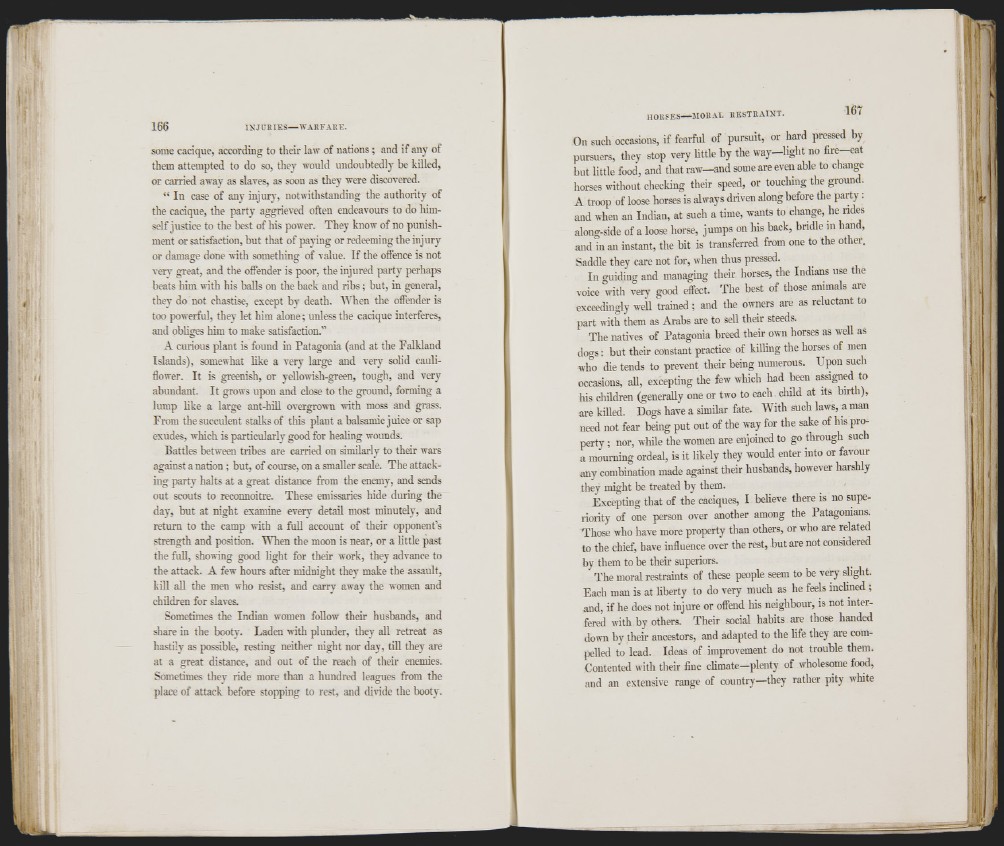
some cacique, according to their law of nations ; and if any of
them attempted to do so, they would undoubtedly be killed,
or carried away as slaves, as soon as they were discovered.
“ In case of anv injurv, notwitlistanding the authority of
the cacique, die party aggrieved often endeavours to do liim-
self justice to the best of his power. Thej- know of no punishment
or satisfaction, but that of paying or redeeming the injury
or damage done with something of value. If the ofience is not
verv great, and the offender is poor, the injured party perhaps
beats him with his balls on the back and rib s; but, in general,
they do not chastise, except bv death. M'hen tlie offender is
too powerfid, thev let him alone; unless the cacique interferes,
and obliges him to make satisfaction.”
A curious plant is found in Patagonia (and at the Falkland
Islands), somewhat hke a very large and very solid cauliflower.
I t is greenish, or yellowish-green, tough, and verj'
abundant. I t grows upon and close to the ground, forming a
lump like a large ant-hill overgrown with moss and grass.
From tlie succulent stalks of this plant a balsamic juice or sap
exudes, wliich is particularly good for healing wounds.
Battles between tribes are carried on similarly to their wars
against a nation ; but, of course, on a smaller scale. The attacking
party halts at a great distance from the enemy, and sends
out scouts to reconnoitre. These emissaries hide during the
day, hut at night examine every detail most minutely, and
return to the camp with a fuU account of tiieir opponent’s
strength and position. Hlien the moon is near, or a little past
the full, showing good hght for their work, they advance to
the attack. A few hours after midnight they make the assault,
kill all the men who resist, and carrv away the women and
children for slaves.
Sometimes the Indian women follow their husbands, and
share in the booty. Laden with plunder, they all retreat as
hastily as possible, resting neither night nor day, till they are
at a great distance, and out of the reach of their enemies.
Sometimes tliev ride more than a hmidred leagues from the
place of attack before stopping to rest, and divide the booty.
h o r s e s ^ m o r a l r e s t r a i n t . 167
On such occasions, if fearful of pursuit, or hai-d pressed by
pursuers, they stop very httle by the w ay -lig h t no h re -e a t
but little food, and t h a t r a w — and some are even able to change
horses without checking their speetl, or touclung the ground.
A troop of loose horses is always driven along before the party :
and when an Indian, at such a time, wants to change, he rides
along-side of a loose horse, jumps on his back, bridle m hand,
and in an instant, the bit is transferred from one to the other.
Saddle thev cai-e not for, when thus pressed.
I l l o-uiding and managing their horses, the Indians use the
voice with verv good effect. The best of those animals are
exceedingly well trained ; and the owners ai'e as reluctant to
part with them as Arabs ai-e to sell their steeds.
The natives of Patagonia breed their own horses as well as
dogs: but their constant practice of killuig the horses of men
who die tends to prevent tlieir being numerous. U]»n such
occasions, all, excepting the few wliich had been assigned to
his children (generally one or two to each cliild at its birth),
are kiUed. Dogs have a similar fate. With such laws, a man
need not fear being put out of the way for the sake of his pri>
perty ; nor, wliile the women are enjoined to go through such
a mourning ordeal, is it likely they would enter into or favour
any combination made against their husbands, howei er harshly
thev might be treated hj' them.
Excepting that of the caciques, I believe there is no superiority
of one person over another among the Patagomans.
Those who have more property than others, or who are related
to the chief, have influence over the rest, but ai-e not considered
by them to be their superiors.
The moral restraints of these people seem to be very slight.
Each man is at liberty to do very much as he feels inclined ;
and, if he does not injure or offend his neighbour, is not interfered
with by others. Their social habits are those handed
down bj' their ancestors, and adapted to the hfe they are compelled
to lead. Ideas of improvement do not trouble them.
Contented with their fine climate—plenty of wholesome food,
and an extensive range of country—they rather pity white
...
( ■
I